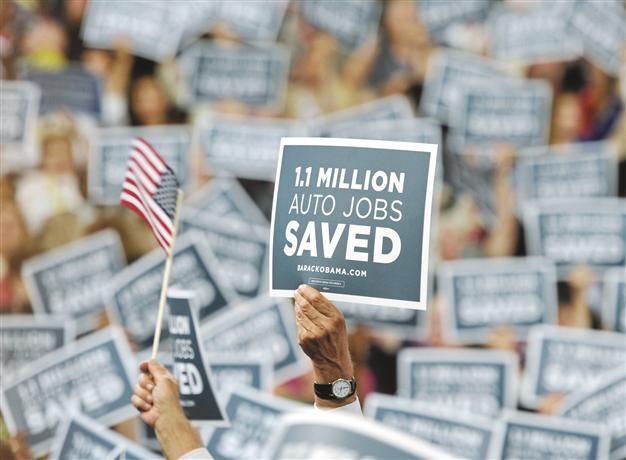Obama heads back to fight against dire economy woes
WASHINGTON

A man waves a sign above the others at during the Democratic Convention in North Carolina. A slight improvement in employment helped Obama at the polls.
With an economy-dominated presidential election now in the books, it seems the issue that failed to kill U.S. President Barack Obama’s re-election chances will now become his largest challenge as the country seeks urgent solutions to fiscal problems, growth risks and unemployment.
“Growing optimism about the economy and a big turnout of the core Democratic coalition sealed President Barack Obama’s re-election victory,” Reuters analyst Tim Reid said yesterday.
Among the most pressing matters is dealing with the so-called fiscal cliff – a combination of higher taxes and government spending cuts that automatically take effect unless Congress acts by Jan. 1. Economists warn that no action will push the economy back into recession.
Congress has so far been unable to find common ground on the tax and spending cuts, and results of the congressional races that were up for grabs point to yet more gridlock: Democrats retained control of the Senate, while Republicans kept their solid majority in the House of Representatives.
This is by no means a good sign to overcome the government’s $16 trillion debt and the looming “fiscal cliff” – a $600 billion tax increase, which poses risks to growth.
“I think stock market investors are likely to remain reasonably cautious before getting an idea of how that is going to be resolved,” the Associated Press quoted Ric Spooner, chief market analyst at CMC Markets in Sydney, as saying. “The fiscal cliff will remain a source of concern so I think we’ll see some negative premium built into the U.S. dollar.”
“Yet Obama’s victory in the face of such a high unemployment rate was remarkable given the historical winds he faced,” Reuters said, noting that no U.S. president had won re-election with an unemployment rate of over 7.2 percent since Franklin Roosevelt in 1936,” Reuters said.
The dollar slipped in Asian trading yesterday while share markets were muted after Obama’s win, Agence France-Presse said.
The U.S. unit fell against the euro and yen in afternoon trading, as dealers bet that, under Obama, the Federal Reserve would continue the loose monetary policy that has seen it flood markets with billions of dollars.
The European single currency bought $1.2840 in Tokyo, well up from $1.2788 earlier yesterday and $1.2814 in New York late on Nov. 6. The U.S. dollar was at 80.25 yen compared with 80.34 yen in New York. It had fallen to below 80 yen at one point.
The euro bought 103.13 yen, from 102.96 yen in New York.
Wall Street headed for a higher opening, with Dow Jones industrial futures up 0.1 percent to 13,213 and S&P 500 futures adding 0.1 percent to 1,426.90.
Investor George Soros said late Nov. 6 that Obama’s re-election would open “the door for more sensible politics.”
Soros, who has contributed mightily to Democratic causes and supported many liberal and progressive groups, told Reuters: “I’m delighted that President Obama has won. The American electorate has rejected extremist positions.”
In an email exchange with Reuters, Soros, who was in Budapest, said he hopes “the Republicans in office will make better partners in the coming years.”
